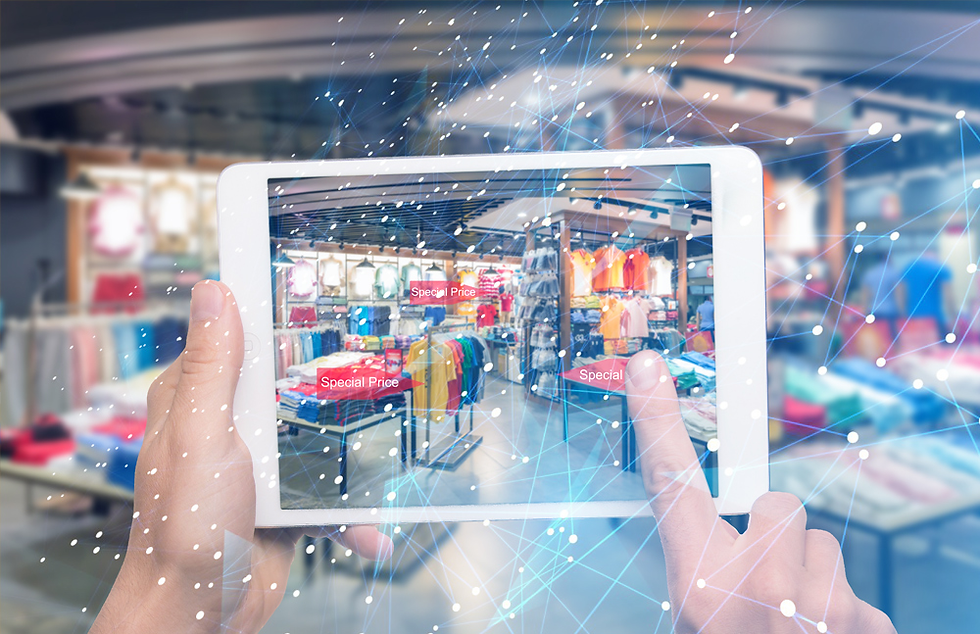Revolutionizing Retail: The Power of AI in the Retail Sector
- Gian Sharma
- Jul 3, 2023
- 2 min read
#AIinRetail #RetailTransformation #CustomerExperience #InventoryManagement #SupplyChainOptimization #Chatbots #PricingOptimization #FutureofRetail #CraftyCreativeCurves

In recent years, the retail sector has experienced a significant transformation driven by technological advancements. One such technology that has reshaped the retail landscape is Artificial Intelligence (AI). With its ability to analyze vast amounts of data, automate processes, and deliver personalized experiences, AI has become a game-changer for retailers. In this blog, we will explore the various ways AI is revolutionizing the retail sector and its impact on the industry's future.
#1. Enhanced Customer Experience
AI has enabled retailers to provide highly personalized and tailored experiences to their customers. By analyzing customer data, including purchase history, browsing behavior, and demographics, AI algorithms can generate valuable insights and recommendations. This allows retailers to offer personalized product recommendations, customized offers, and targeted marketing campaigns, increasing customer satisfaction and loyalty.
#2. Intelligent Inventory Management
Managing inventory efficiently is crucial for retailers to avoid overstocking or running out of stock. AI-powered systems can accurately predict demand patterns, optimize inventory levels, and automate replenishment processes. By leveraging machine learning algorithms, retailers can identify trends, seasonality, and other factors that impact demand, enabling them to make data-driven decisions and reduce operational costs.
#3. Smart Visual Merchandising
AI technology, particularly computer vision, has transformed the way retailers approach visual merchandising. By analyzing images and videos, AI systems can recognize and categorize products, identify trends, and assess the effectiveness of displays. This information allows retailers to optimize store layouts, improve product placements, and enhance the overall shopping experience.
#4. Efficient Supply Chain Management
The retail sector heavily relies on efficient supply chain management to ensure products are delivered promptly and cost-effectively. AI-powered algorithms can analyze vast amounts of data related to logistics, transportation, and inventory, enabling retailers to optimize routes, minimize costs, and streamline operations. Additionally, AI can improve demand forecasting accuracy, reducing stockouts and increasing supply chain resilience.
#5. Fraud Detection and Security
AI plays a vital role in safeguarding retail operations against fraud and security threats. Machine learning algorithms can detect anomalies, patterns, and suspicious activities in real-time, flagging potential fraudulent transactions or security breaches. By leveraging AI-powered systems, retailers can enhance security measures, protect customer data, and prevent financial losses.
#6. Chatbots and Virtual Assistants
AI-powered chatbots and virtual assistants have revolutionized customer support in the retail sector. These intelligent systems can provide instant responses to customer queries, assist with product information, and even process transactions. By leveraging natural language processing and machine learning, chatbots and virtual assistants enhance customer service, reduce response times, and improve overall customer satisfaction.
#7. Pricing Optimization
AI algorithms can analyze market trends, competitor pricing, and customer behavior to optimize pricing strategies. By dynamically adjusting prices based on demand, inventory levels, and other factors, retailers can maximize revenue and profit margins. AI-powered pricing optimization enables retailers to remain competitive in a rapidly changing market and respond to price fluctuations effectively.
Conclusion
The integration of AI in the retail sector has brought about remarkable changes, empowering retailers to deliver exceptional customer experiences, streamline operations, and drive growth. From personalized recommendations to intelligent inventory management, AI has become an indispensable tool for retailers aiming to stay ahead in a highly competitive market. As technology continues to evolve, it is evident that AI will continue to shape the future of the retail industry, opening up new possibilities and opportunities.




Comments